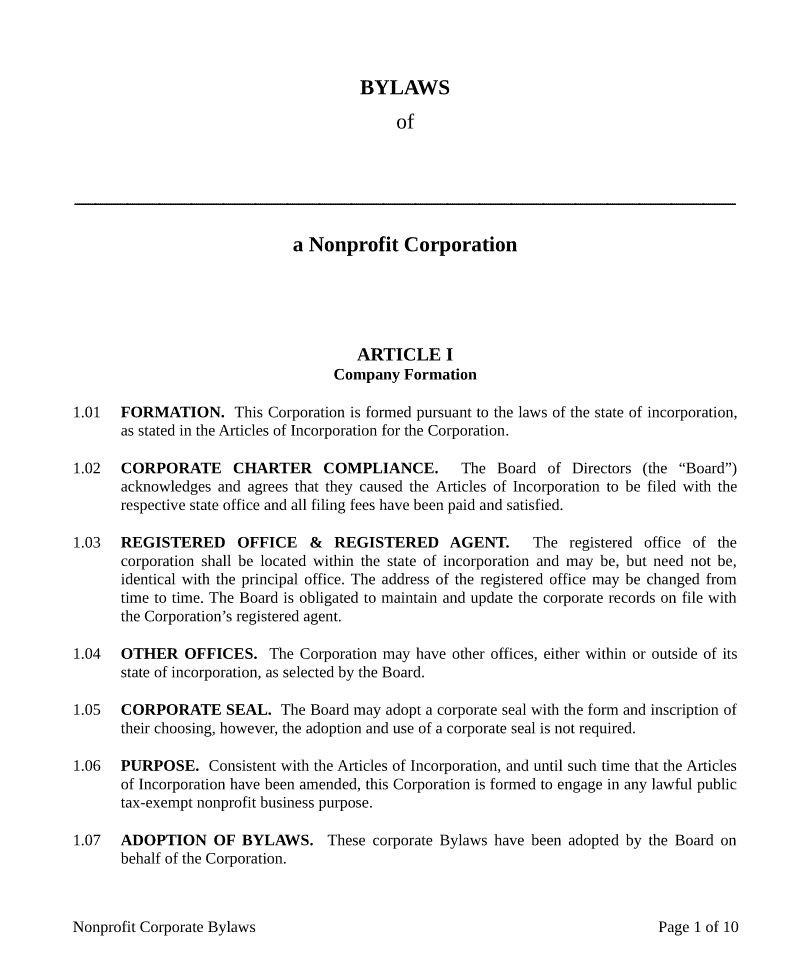Minnesota Nonprofit Bylaws
Minnesota nonprofit bylaws are an internal document with the rules and procedures that the nonprofit follows. Bylaws lay out the exact processes for actions such as quorums, director responsibilities and tenure, and emergency protocols.
Nonprofit bylaws exist to make your nonprofit easier to run, with fewer hurdles down the road. In order for your nonprofit to be successful, it helps to write thorough and direct bylaws. Use our attorney-drafted template to get started.
Why does a Minnesota nonprofit need bylaws?
In order to successfully run and grow your nonprofit, you will need to react quickly and efficiently to all sorts of surprising events. Your board needs a new member suddenly? Your biggest donor pulled out? You can’t find a good meeting time for a vote? These are all situations that, without bylaws, you might have to consult Minnesota legal statutes or decide protocols suddenly without any preparation.
Unlike your Minnesota Nonprofit Articles of Incorporation, you do not need to submit your bylaws with the state. Bylaws are more like a guidebook for your nonprofit. By putting into place rules and procedures, you prevent the nonprofit from having to scramble down the line.
1. Nonprofit bylaws are highly encouraged.
According to MN Stat § 317A.181 (2021), Minnesota does not legally require you to adopt bylaws. However, we do recommend that you prepare and adopt a set of bylaws anyway. Bylaws make things like voting and disputes easier to handle.
Additionally, bylaws are a foundational document that sets the nonprofit up to grow bigger and to gain more traction without any hiccups in productivity.
2. Third parties will ask to see your bylaws.
People outside of your organization might ask to see your bylaws. For example, when you open up a business bank account, you might be asked to provide proof your nonprofit’s existence or proof an individual has the authority to open an account for the business—bylaws work for this. Big donors might want to see that your nonprofit has regulations and contingency plans before committing to you—bylaws help with this, too.
Also, if you want to apply for the IRS 501(c)(3) tax-exemption status, you will need to attach your bylaws to the application.
3. Nonprofit bylaws allow you more control over your nonprofit.
Your bylaws will include what is allowed and not allowed by your officers, members, and employees, as well as how to handle conflicts of interest and disputes. Having thorough nonprofit bylaws means that when situations arise and there is a dispute, there is already a plan in place for you to follow and you can handle the dispute internally.
Without bylaws, there is less protection over disputes, and you’re more likely to end up in a courtroom where the state will decide how to proceed. This can result in a huge headache. It takes the control outside of your organization. By crafting bylaws, your nonprofit can better keep disputes and the responses to disputes internal.
Want to learn more? Check out our Guide to Nonprofits.
What do Minnesota Nonprofit Bylaws include?
Minnesota nonprofit bylaws can include any process, procedure, or rule that you want, as long as it does not go against any state law or what you already have in your Articles of Incorporation. This includes requirements such as:
- board member responsibilities and tenure
- board meetings
- voting and quorum
- director compensation
- record keeping
- bylaw amendments
- nonprofit dissolution
Are nonprofit bylaws legally binding?
Yes. If your board of directors properly drafts and adopts the bylaws, then the bylaws will be as legally binding as the Minnesota legal statutes.
Are nonprofit bylaws public record?
Not automatically. Your bylaws exist as an internal document for the running of your nonprofit. However, there are situations in which the bylaws could be made public – such as filing for the 501(c)(3) tax-exempt status with the IRS. This involves an application that includes your bylaws, which the IRS will make public.
No. The bylaws will be legally binding without signatures. However, we recommend having your bylaws signed by the board of directors at your first organizational meeting. This makes sure that everyone is up to date on the legally binding regulations for the nonprofit from the start.
Yes. Your bylaws can be amended whenever you’d like, as long as you follow the procedure listed in the initial bylaws. You will likely need to revisit and amend the bylaws as your organization grows.
Your bylaws are adopted by your board of directors or the majority of incorporators. This is typically done before incorporation at the first organizational meeting of the nonprofit.
